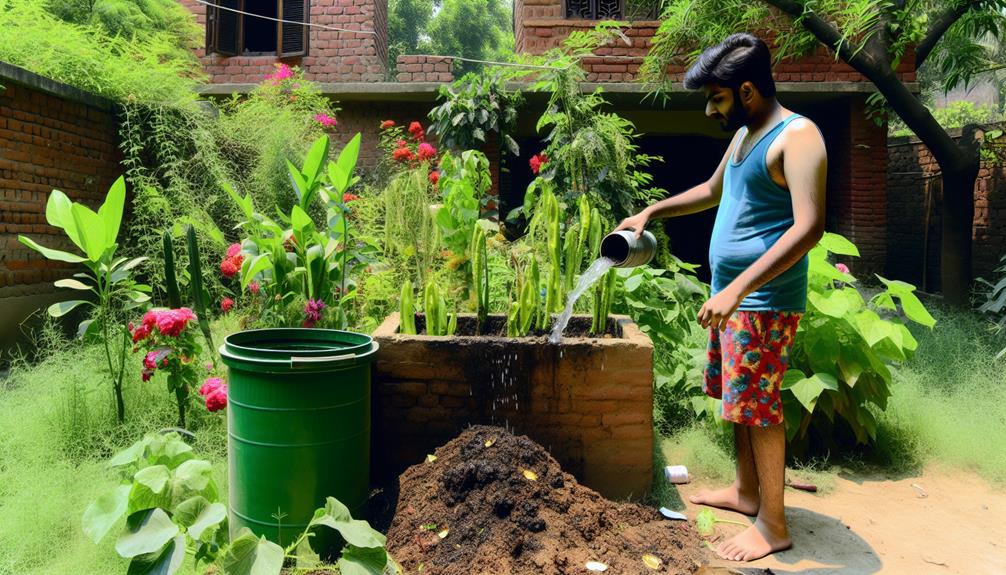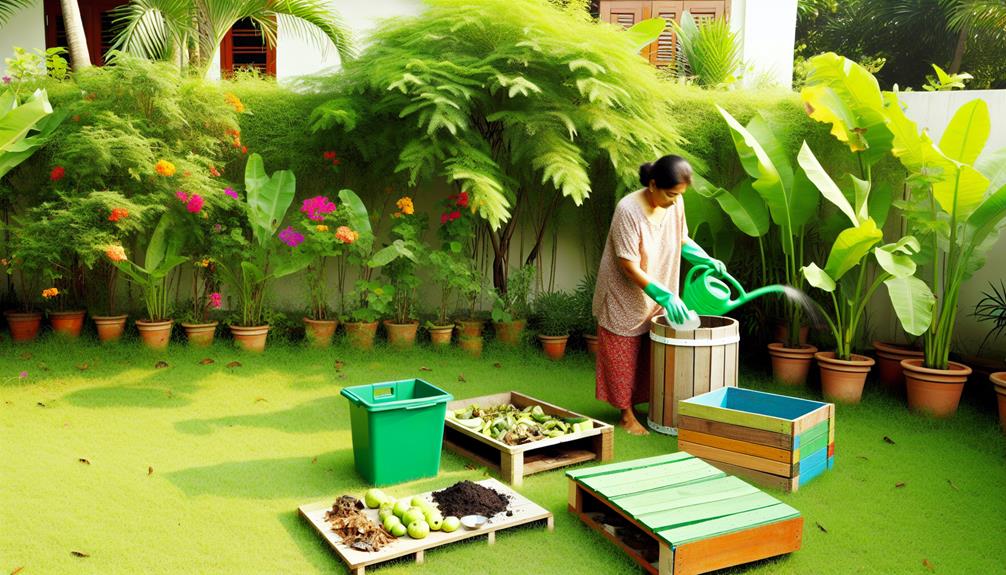

Yes, you can compost urine to take advantage of its high nitrogen content, which speeds up decomposition and enriches your compost. To do this safely, dilute urine with water in a 10:1 ratio before adding it to your compost pile. Make sure to layer it with other green and brown materials to keep everything balanced and avoid odors.
This practice not only boosts microbial activity but also provides essential nutrients like phosphorus and potassium for healthier plants. Properly managed, urine is safe and beneficial, barring medication use. You’ll find more tips on achieving the best results ahead.
Urine composting works by harnessing the nitrogen-rich content of urine to accelerate the decomposition of organic matter. When you add urine to your compost pile, you’re introducing an important element that boosts microbial activity. These microbes are essential for breaking down organic materials into nutrient-rich compost.
The high nitrogen content in urine acts as a powerful catalyst in this process. It’s like giving your compost pile a boost of energy, making the microbes more active and efficient. This enhanced microbial activity speeds up the decomposition of carbon-rich materials, such as leaves and straw. By doing this, you’re ensuring that your compost matures faster and becomes more nutrient-dense.
To make the most of urine composting, make sure you’re balancing the nitrogen (urine) with carbon-rich materials. Too much nitrogen can make your compost pile too hot, which might harm the beneficial microbes. Aim for a mix that keeps the pile warm but not overheated.
Also, regularly turning the compost will help distribute the nitrogen evenly and maintain an ideal microbial activity level. By following these guidelines, you’ll foster a thriving compost system that benefits your garden and connects you to a sustainable community.
Also Read: Can You Compost Body Wash?
By incorporating urine into your compost, you’ll enrich it with essential nutrients like nitrogen, phosphorus, and potassium, which are important for plant growth. This nutrient composition makes urine an excellent natural fertilizer that can greatly enhance your compost’s quality.
Here’s how these nutrients contribute to soil enrichment:
Also Read: Can You Compost Blood?
To safely add urine to your compost, make sure you dilute it with water at a ratio of at least 10:1 to prevent over-concentration of nutrients. This dilution guarantees that the compost pile remains balanced and doesn’t get overwhelmed by too much nitrogen, which can inhibit the composting process.

Once you’ve prepared the diluted urine, it’s time to think about compost layering. Proper layering helps maintain the right balance of green and brown materials, essential for efficient composting. Start by adding a layer of brown materials, like leaves or straw, to create a base. Then, evenly distribute the diluted urine over this layer to ensure it’s well absorbed. Follow this with a layer of green materials, such as kitchen scraps or grass clippings.
Here’s a quick reference table to guide you:
| Step | Action |
|---|---|
| 1 | Dilute urine with water at a 10:1 ratio |
| 2 | Add a layer of brown materials to the compost |
| 3 | Pour diluted urine evenly over the brown layer |
| 4 | Add a layer of green materials on top |
Many people believe that using urine in compost is unsanitary, but that’s far from the truth. Urine is actually sterile when it leaves the body and contains valuable nutrients like nitrogen, potassium, and phosphorus.
Let’s debunk some common myths surrounding urine composting:
Also Read: Can You Compost Black-Eyed Peas?
For successful urine composting, make sure to dilute the urine with water in a 1:3 ratio before adding it to the compost pile. This helps prevent nitrogen overload, which can harm your compost.

To make collection easier, consider using a dedicated container for urine collection methods. These containers should be easy to clean and have a secure lid to minimize odors and prevent spills.
When selecting storage containers, choose ones that are durable and made from materials like plastic or stainless steel. Ensure they have a tight seal to keep the contents contained until you’re ready to use them. Position your collection containers in convenient locations, such as near a bathroom, to make the process more efficient.
Adding urine to the compost pile should be done gradually. Pour the diluted urine evenly over the pile to ensure even distribution. This helps maintain the balance of moisture and nutrients, promoting ideal composting conditions.
Also, be mindful of the overall moisture level in your compost. Too much liquid can turn your pile anaerobic, leading to unpleasant odors.
Yes, urine can attract pests or animals to the compost pile. To prevent this, use pest deterrents like citrus peels or animal repellents like cayenne pepper. Keep your compost community-friendly and free from unwanted visitors.
When adding urine to your compost, it won’t cause odor issues if you manage pH levels and balance its high nitrogen content. It’s a great way to contribute to your community’s eco-friendly practices and feel connected.
You can add urine to your compost pile a few times a week. Just make sure you maintain nitrogen balance and monitor moisture levels. This way, you’ll keep your compost healthy and efficient, just like your community.
Yes, it’s safe to use composted urine in vegetable gardens. You’ll enhance your garden’s nutrient content and maintain pH balance. By doing this, you’re contributing to a sustainable community that values natural and effective gardening methods.
When considering legal restrictions on composting urine, you’ll need to research local regulations. Legal considerations often aim to minimize environmental impact, ensuring safe practices. Connect with local composting groups to share knowledge and foster community.
To successfully compost urine, remember to balance it with carbon-rich materials like leaves or straw. Always dilute urine to prevent nitrogen overload.
Add it directly to the compost pile and turn regularly to aerate.
Debunk myths by understanding that urine, when handled properly, is safe and beneficial.
Follow these tips, and you’ll enhance your compost’s nutrient profile effectively. With proper management, you can safely and efficiently harness urine’s composting potential.

Don't let aphids, slugs, and caterpillars ruin another plant. Take back control with simple, natural methods that actually work.